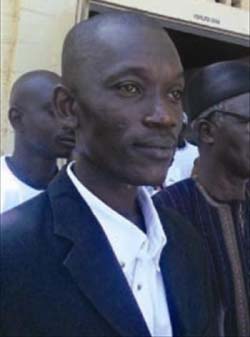
Officials of the West African Agricultural Productivity Programme (WAAPP) and the National Agricultural Research Institute (NARI) and others from the Department of Agriculture recently concluded a five-day tour on the six agricultural regions of the country.
The tour was held to strengthen and enhance agricultural production and productivity of the farmers in the country.
The country tour was also coordinated and funded by the WAAPP Project in a bid for NARI and agric officials to meet the regional directorates to sensitize them about the values chain approach; that is establishing innovation platform, which is in line with the integrated agricultural research and development.
The approach intended to be introduced is in line with the CAAPP pillar four and also in line with the approach to Agricultural development.
The system involves the participation of all the stakeholders during the implementation of the project.
Speaking at the meetings held with local officials and authorities, the country coordinator of WAAPP, Sheikh Tijan Sosseh, said the purpose of the tour was to see how best all actors ranging from researchers, the producers, the private sector, the media, the marketers and all and sundry, can participate in the implementation of the project.
He said that during the implementation process farmers will be organised and given a package of seed and fertilizer of three commodities which include groundnut, maize and rice.
He noted that in the past, farmers were experiencing low yield compared to potential yield that can be driven from those crops.
He said with the innovation platform there will be close technical support for the farmers to guide them to increase their yield.
He added that as far as the innovation platform is concerned all actors will be sensitized by the WAAPP, on the values chain approach.
According to the WAAPP Country coordinator, the key issues from the project management was that input must go with output, adding that where much is given much is expected, he emphasised.
He added that looking at the GEAAPP project, it has created a very positive impact and the trend has to continue on WAAPP.
According to the WAAPP country coordinator, the project spent three million two hundred and fifty thousand dalasi to procure one hundred and eight metric tonnes of seeds and in addition the project will be procuring fertilizers to be given to the farmers through the regional directorate and NARI.
He further revealed that the project has already procured twenty-three tonnes of maize, fifty tonnes of groundnut seed, and thirty-five tones of rice seed with the aim to help the farmers in the increase of their agricultural productivity.
According to him, the seed that are being procured would reach the farmers latest next week, and the process has commenced.
The key expectation of this is to meet their objective of the project at the end of the day which is a result based.
He further revealed that the project will be signing memoranda of understanding with many institutions and stakeholders so they can be tasked with the responsibility of implementing relevant activities at their intervention sites.
The project will be facilitating the logistics for them to attain those result under close coordinating and monitoring, he said.
The director of research at NARI, Dr Lamin Jobe, expressed delight for the response of the regional directorates to the important sensitization on the new agricultural innovation platform to be implemented by various stakeholders through WAAPP.
He added that creating awareness by this new approach is very key to agricultural development.
Dr Jobe stressed that the sensitization will give the opportunity to the extension workers, researchers, producers, marketers and other actors to work together in the best interest of the farmers.
He added that the significance attached to the sensitization cannot be over-emphasized as now this new value chain will be applied to enable everybody to play a role in the implementation of the project.
Read Other Articles In Article (Archive)



